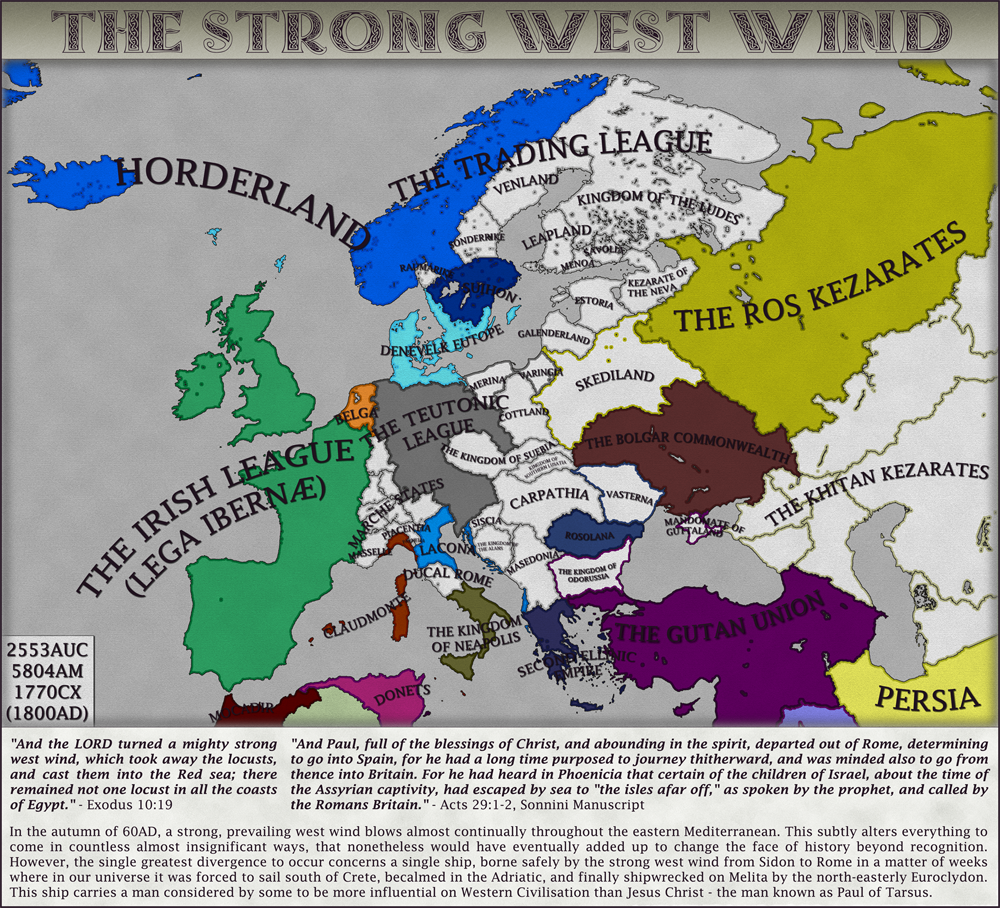HOME | DD
 SRegan — The Strong West Wind - AH map and scenario
SRegan — The Strong West Wind - AH map and scenario

#alternatehistory #europe #map #photoshop #irishleague #irishempire #serapism
Published: 2014-11-20 19:30:45 +0000 UTC; Views: 6242; Favourites: 35; Downloads: 28
Redirect to original
Description
"You say that you are not at war with us - but we are at war with you, always. This is our world, says the Scripture, and we lay the foundations of our Jerusalem in your children, and the beams in your children's children, and the bricks thereof in your children's children's children."I'm not hugely happy with this - I decided shortly after finishing the borders that I wanted to add rivers, but the basemap I was using made it frustratingly difficult, so eventually I gave up on it, with the result that it looks a bit bland. The original plan was to add Celtic-style borders, but given that I grossly underestimated the file size with the effects I'm using already, I thought it best to leave it as is. It's an improvement on my previous map of the same world, anyway. This is about as big as I dare make it - if you can't make it out *Slovakia is the Kingdom of Southern Lusatia and *Bosnia is the Kingdom of the Alans.
This is Europe circa ~1800 in my long-standing TL concept "The Strong West Wind" (formerly "I Am Sure Happiness Is Not Too Far Away"), inspired by the late John Reilly's The Irish Empire and exploring ideas such as a China-style isolationist state in Europe and colonisation driven by much smaller powers. TSWW takes as its P.O.D. the shipwreck of Paul of Tarsus on Malta - in this TL, the ship taking Paul to trial instead enjoys a favourable westerly wind and he reaches Rome before year's end. He is acquitted in 61AD rather than 63AD - Paul interprets this as a sign that he is to press on and establish a ministry in the Western Empire. With no time to write the prison epistles, the character of the eastern Christianity he leaves behind is dramatically altered - it slips back into Petrine crypto-Jewish exclusivity and eventually becomes amalgamated with Manichaeism.
Meanwhile, in the West, Paul and his successors push into Spain, Britain, and, armed with native interpreters, into Ireland and the Scottish highlands. When Rome fell (no Byzantium - Serapism turned out to be a poor substitute for Catholicism as far as holding the Empire together went), the governor of Britain decides he'd much rather invite good Christian Irish mercenaries to protect them from the Picts than those dirty Germanic pagans, and gives them generous concessions in southern Britannia Secunda. This proves about as sensible as OTL Vortigern's invitation to Hengist and Horsa , as Britain is promptly colonised by Hibernians, who base their capital at Abona (OTL Bristol) and eventually become identified with Britain rather than Ireland in the same way OTL Anglo-Saxons aren't considered German. A number of Germanic tribes attempt to settle in *Kent and *Northumbria anyway, and are rather brutally driven into the sea. This prompts a slow-burning reconquista of the Western Roman Empire, sparking dozens of wars between the Christianised Celts and the Nordics, Phalians and Germans. Pauline Christianity (especially as expressed in his TTL epistles to the Celtic Churches) turns out to be an excellent tool in justifying total war - the Celts are God's chosen people who have accepted his word. The Germanic and Nordic peoples are the tares, the children of Satan, and cannot be evangelised to, nor negotiated with.
After gobbling up most of Western Europe the Irish states, loosely bound into a federal structure under a High King, settle into a sullen isolationism that leads to their acquiring the nickname 'The Hermit Kingdom'. Throughout the Middle Ages they are wracked by numerous outbreaks of a particularly nasty virus (something between HIV and pulmonary tuberculosis), styled ITTL as the geriatric plague, so-called because it kills the young and otherwise healthy and largely spares those with weak immune systems. This crippling shortage of young men of military age, which lasts well into the 1500s, does nothing for their paranoia and xenophobia.
The great Celt-Nordic wars of the 9th century (primarily over fishing lanes in the North Sea) lead to accelerated maritime development, and North America is discovered when a *Norwegian fleet is swept off course and makes landfall at *Newfoundland. Without the logistical capacity to support colonies in the New World from Scandanavia, subsequent settlers tend to melt away into the Native American tribes, trading their knowledge and livestock for passage down the coast to more hospitable land. Eventually, a chain of small *Norwegian states coalesce on the East Coast, their expansion beyond the Appalacians stymied by native Indian kingdoms armed with metal weapons and European longbows.
There are three distinct calendars in use in TSWW Europe - most states have adopted the Roman calendar and write the year as 2553AUC (Ab Urbe Condita). In the Irish League and the Judaism-influenced East (including the Ros and Bolgar states), the year is given as 5804AM (Anno Mundi). Within the Irish League the year could also be written 1770CR (Christus Rex), this calendar taking as its 'Year Zero' the death and resurrection of Jesus Christ rather than his birth (as OTL Anno Domini).
Islam has not arisen; Pauline Christianity has flourished only in western Europe, with the Irish League as its sole official adherent (though it is gaining popularity with the Belga and some of the other states of the Marches). The Mediterranean is ruled by a syncretic, hierarchical church based in Rome, based on a combination of the Serapistic mysteries, Manichean literature, and Gnostic Christianity. In Anatolia and the Middle East, the Goths hold sway, having been converted to Zoroastrianism. Further East, a diaspora of the Jews has brought Petrine 'Christianity' to the Ukraine, Russia and the steppes. The crypto-Judaism of the Church of Jerusalem more closely resembles Islam than any Christianity we know - with almost no Christology to speak of, it emphasises the keeping of the Mosaic law for salvation and frowns on any sort of representational art. The Germans and Nordics were never converted en masse, but have at length adopted a heterogynous rationalist monotheism integrating Christian, Serapistic, Zoroastrian and Neopythagorean thought. Many of the Khitan vassals are Petrine pseudo-Judaistic, but Khitan itself follows the teachings of a native prophet (Sidurhu) born in the 8th century, who performed miracles which look suspiciously like a 'best of' collection of the other existing religions and, seemingly influenced by Hindu thought, commanded the worship of three gods.
About a hundred years ago the High Kingdom of the Lega Ibernæ abruptly dissolved and was replaced by a unitary state, styling itself a 'military republic' - it operates universal suffrage, although there are heavy restrictions on women's voting rights, and is strongly racialised - Jews receive limited tolerance on religious grounds, but otherwise those who fail to conform closely enough to the Celtic racial type usually disappear in the periodic hysterical purges that characterise the League. Scots and Celtiberians are considered 'marginal types' and are considered acceptable as long as they keep to themselves. In general, the League makes its neighbours rather nervous.
Its primary rival on the European stage is the Teutonic League, itself the rump of the grand old Teutonic Imperium, which broke up messily a few decades ago. The core Teutonic state still has designs on much of its old territory, including the states on the *Baltic coast, the Cotteni state, and the Suebians. It is separated from the Irish League by the splintered and turbulent buffer states of the Marche - in recent years the most prosperous of these states, the Belga, has fallen into the orbit of Abona, something which worries the Teutons no end.
To the north the Varjagliga - roughly translated as the Trading League - rules the *Baltic and North seas. Dominated by the Horder and their eclectic empire (including the distant princedoms in Occidens), the Trading League is a loose alliance of generally progressive nations who have traditionally presented a unified front against the Ros, the Skedi, and the western powers. There are some exceptions - the Denes have gotten some weird ideas about communal property recently and no-one's sure how to take them, and the Ludes are Varjaglida members in name only, given that most right-thinking people find them scarier than the Ros. The Trading League are the most vigorous explorers and colonisers of the world, supplanting the old Serapist Navigator states of the Mediterranean (the Greeks at their height controlled much of India and had huge concessionary zones in China - today they've been beaten back to the Asiatic archipegalos and South Africa).
The Goths trekked south until they reached the Mediterranean then made the crossing to Anatolia - the Gutan Union as it exists today is the bogeyman of the Mediterranean, a Zoroastrian goliath that has fortunately spent much of its existence scrapping with the Bolgars (who decided to settle right on what the Goths considered their holy trail from the north) over Guttaland (OTL *Crimea). Currently the offending territory (ethnically Bolgar but largely Zoroastrian rather than pseudo-Judaistic) is a nominally independent state ruled as a theocracy by a Gutan Mandom.
Technology in 1800AD is rather ahead of our own - a primitive telegraph system has been implemented across much of Europe, and bolt-action rifles have found their way into the hands of the tribal confederacies still holding out in the Westerlies. The biological and pure sciences, in contrast, are severely retarded - unsurprisingly so, given that this is a world where most religious philosophies forbid or at least discourage study of the natural world as an evil and misleading phantasm or a distraction from spiritual development, and the others require their men of science to harmonise their findings with Hebrew scripture.
Related content
Comments: 6

Hey, if Petrine Christianity is Islam, what would they call their version of the Caliphate?
👍: 0 ⏩: 1

Hmm, I'd suggest something relating to the katechon, except that also comes from Pauline writings. Perhaps Poemeniarchy ('Poemeniaky'?), stressing apostolic succession to Peter as designated 'shepherd'? Alternatively, something relating to overseeing/watching - 'Episkopy'?
When I compared it to Islam it was more in terms of its strong legalistic thrust and opposition to representational art and music rather than having an integrated political system baked into the religion. Petrine writings are often addressed to 'the strangers' - perhaps Petrine Christians see themselves as having a community called the Parepidemoi or Gerimaky, which exists within and alongside the political system, with its own parallel court systems for believers to desolve disputes (think sharia or beth din).
👍: 0 ⏩: 1

Not gonna lie, I fit right in with the Petrines. If they see themselves as foreigners in the lands they live in, then I'd have to say that they actually got the idea of what Jesus taught better than most OTL denominations. That and, I do not believe that Jesus abolished the Law. However, I would disagree with them on the aspect of Christology, given that I do hold to the idea of Jesus being the Son of God, and that the Father was indwelling in Jesus. I would also disagree with the belief they must adhere to the Law to be saved. In my opinion, the Law exists to point out the need to a Savior, the same who fulfilled the sacrifices, redefined what the Temple is, and what the exact meaning of the Jubilee was. I do not keep the Law to be saved, only faith and a true change of heart can do that, but I keep a fulfilled Law because of my salvation.
👍: 0 ⏩: 0

Thanks - I may do more on this scenario one day; I was always bothered by the tension between the original 'reverse John J. Reilly's Irish Empire scenario so the Irish are the bad guys and the Aztecs are the good guys' and the 'Irish Draka' motif that crept in later.
👍: 0 ⏩: 1

You're welcome
Draka... that concept never changes huh ?
👍: 0 ⏩: 0



























